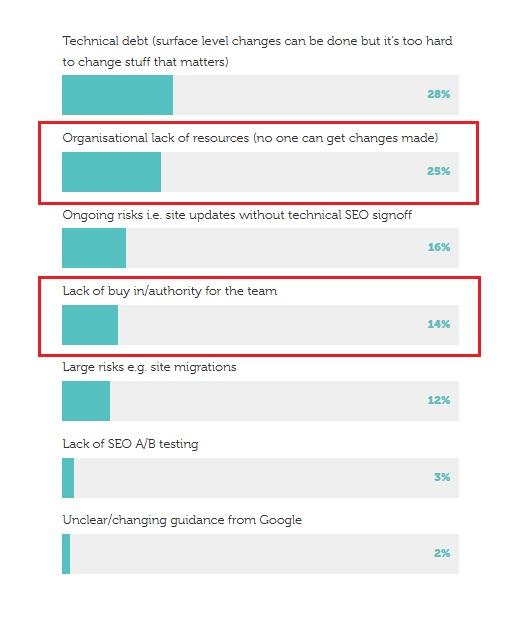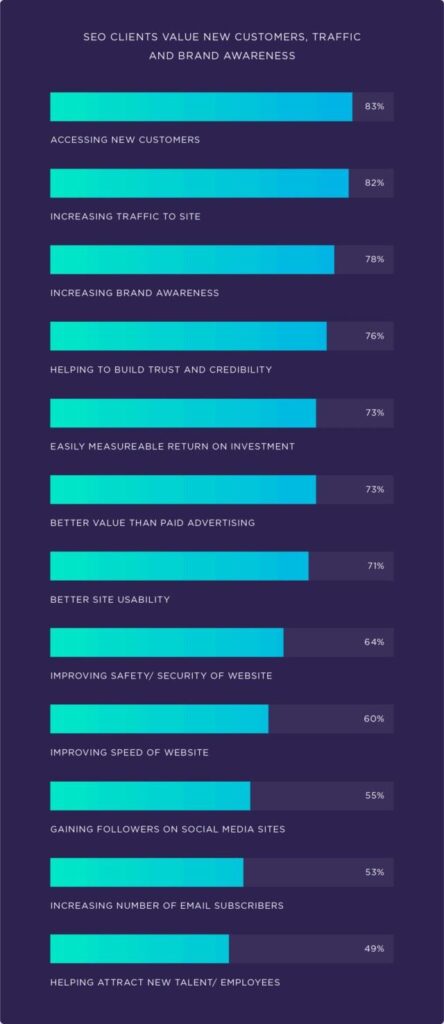Your clients need to understand what SEO does for their business.
They don’t need to know all the technical jargon. But they do need to know how SEO efforts translate into real benefits.
At best, they know they want SEO, but they might not even know why.
That’s why client communication is so important for agency owners.
You need to make SEO easy to understand and avoid overwhelming your clients.
And that’s what we’re going to cover in this guide.
You’ll learn how to explain SEO to clients and highlight the value of your services.
Why Educate Clients About SEO?
Educating clients helps them understand the value of what you’re offering. When clients know how SEO works and why it’s important, they’re more likely to see it as a worthwhile investment.
In a recent survey, a lack of resources and a lack of buy-in were ranked as two of the biggest risks to successful technical SEO projects:

Client education helps you get the buy-in and resources you need to achieve great results.
It also helps you set realistic expectations. If clients aren’t familiar with SEO, they might expect instant results.
For example, they might think you can get their brand-new website to rank for a highly competitive keyword overnight. That’s just not going to happen.
Unrealistic expectations only lead to frustration for you and the client.
Informed clients also tend to be the best partners. They understand what’s involved and what you need to succeed.
This makes your job easier and can lead to better results.
How to Educate Clients About SEO
Here’s how to explain SEO to your clients in a way that’s clear and easy to understand:
Assess Their SEO Knowledge
First, you need to get a good idea of how much your clients already know about search engine optimization. This will help you tailor your explanation.
Asking a few simple questions can give you insight into their current understanding.
Here are a few examples:
- What do you think SEO involves?
- Do you know how search engines decide which websites to show first?
- Have you worked with an SEO agency before?
- Has your team implemented any SEO strategies on your website?
If the client has some experience, you can skip the basics and focus more on the tactics you plan to use to boost their search ranking. If they are new to the SEO industry, you’ll need to start with the fundamentals.
Explain the Fundamentals of How SEO Works
Everything you do to improve your client’s website falls into three main areas. By breaking down SEO into these pillars, you can make it easier for clients to understand your strategy.
On-Page SEO
On-page optimization is the things you do to improve individual pages. It’s all about creating high-quality content that is relevant and engaging. And making sure that search engines and users can find the content.
This includes using the right keywords that people are searching for, crafting compelling meta titles, and making sure the content is well-structured.
Off-Page SEO
Off-site SEO involves actions taken outside of your website to impact your rankings. The main focus here is on building backlinks and local SEO citations.
These are links from other websites to yours. Search engines use backlinks to determine if your content is trustworthy and relevant.
Technical SEO
Technical SEO is what happens behind the scenes to make your website more accessible and enjoyable to use. This includes making your site faster, mobile-friendly, and easy for search engines to crawl and index.
Make SEO Relatable
You can make your strategy more relatable by comparing your SEO techniques to tasks the client already performs in their business. This helps clients understand the work you do.
For example, internal linking can be confusing. In technical terms, it involves creating hyperlinks to connect different pages on your website. These links help users navigate your site. They also help search engines understand the structure of your site and distribute “link equity.”
But you need to explain that in a way that’s much easier to grasp.
So you can compare it to setting up helpful signs in a store. Just as signs guide customers to different sections, internal links help visitors find their way around the different pages on your site.
You can compare link building to getting endorsements from well-known people and publications in your industry.
If your client runs a restaurant, getting a mention from Gordon Ramsay in an interview would boost their reputation and draw in more customers.
Link building has a similar effect. Getting a reputable publication like Time Out or Esquire to link to your content shows search engines that your site is trustworthy and relevant.
Explain That SEO Is About People First
Many clients new to SEO think it’s all about using tricks to fool search engines into ranking a website higher. But that’s not what SEO is about.
You need to get your clients to see SEO as a people-first marketing strategy.
Explain that high-quality content is at the heart of SEO. This means writing useful, informative, and engaging blog posts and product descriptions.
The content should address the questions and needs of the target audience.
15% of all Google Searches in 2020 had *never been searched before.*
SEO is directional folks. Use the tools to help play the game, but write and produce for the people (not the bots) first. https://t.co/7nWAfIaqsn
— Tracey Wallace (@TraceWall) December 19, 2020
Highlight the importance of user experience and its impact on rankings. Their website should be easy to navigate and load quickly.
This makes the experience more enjoyable for visitors and increases the chances of conversions. And it also signals to search engines that the site is worth ranking higher.
Explain How SEO Relates to Wider Marketing Goals
You can make a stronger case for SEO by showing your client how it fits into their overall marketing strategy.
SEO isn’t just about getting higher search engine rankings. It’s about achieving broader marketing goals and driving business growth.
The CEO doesn’t buy your SEO pitch because you don’t tie your work to business goals.
The CPO doesn’t allocate resources to your SEO work because you don’t explain how it fits in the Product roadmap.
The Dev team doesn’t prioritise your SEO recommendations because you failed to…
— Pedro Dias (@pedrodias) February 7, 2024
Focus on how SEO can boost brand visibility.
When a website ranks higher in search engine results, more people see it. That increased online visibility means more traffic and more potential customers discovering the business.
It’s also important to explain how SEO can improve the performance of other digital marketing channels.
For example, SEO keyword research can help you discover relevant topics your customers care about. You can use these insights to inform your paid ads strategies, social media marketing, and email campaigns.
By explaining how SEO supports the client’s marketing and business goals, you can help them understand its value.
Explain That SEO Is a Long-Term Process
SEO is not a quick fix.
While some quick wins can give an immediate boost, SEO is really a long-term strategy.
You need to ensure that your client understands the SEO process and how long it will take for them to see results.
One way to explain this is to compare SEO to going to the gym.
You wouldn’t expect to walk into the gym, do a few bicep curls, and walk out looking like Arnold Schwarzenegger.
SEO works the same way – it takes consistent work and dedication.
How To Explain SEO to Others: Tip by @DClutt via #semrushchat http://t.co/LPmNoOFsvf pic.twitter.com/t2tI9K247T
— Semrush (@semrush) June 16, 2015
Search engine algorithms are constantly changing, and competitors are always working on their own SEO strategies.
To stay competitive and increase your rankings, you need regular updates and optimization. This includes adding fresh content, updating old content, and continually building backlinks.
But the benefits of SEO build up over time. It might take a while to see results, but the work you put in now will keep paying off down the line.
Helping your clients understand the time and effort required creates a strong foundation for your strategy.
Focus on What Your Clients Care About
Your clients don’t care about the intricate details of canonical tags, crawl budget, or topical authority. They’re interested in results and the overall impact on their business.
You need to communicate the value that you create with your SEO services.
There’s one skill that’s made me significantly more money than anything else.
It’s not web design.
It’s not investing.
It’s not SEO.It’s communication.
Learning to effectively explain how I can create value for other people.
This is a “first domino” skill. Learn it.
— Shane Martin (@Shane___Martin) June 28, 2023
Focus on what your clients care about.
In a recent Backlinko survey, SEO clients ranked accessing new customers, organic traffic, and brand awareness as the top benefits of an SEO strategy:

You need to explain how your SEO efforts can help them realize these benefits and generate a positive return on investment (ROI).
Case studies can be very useful here. Share success stories from previous clients to show what can be achieved. This makes SEO more relatable and tangible.
Describe the previous client’s situation, what you did to address it, and the outcome.
This helps build trust and demonstrates the potential value of SEO.
Build Stronger Client Relationships with SEO Education
Helping your clients understand SEO is key to proving the value you offer.
Educated clients are more likely to appreciate your work and see the impact on their business. You can build trust and inspire confidence.
That’s how you get clients to buy into your strategy. It sets a strong foundation for your working relationship.
Become a Pro at SEO
Join 65,000 others and learn the secrets to SEO success with our weekly blog posts.
